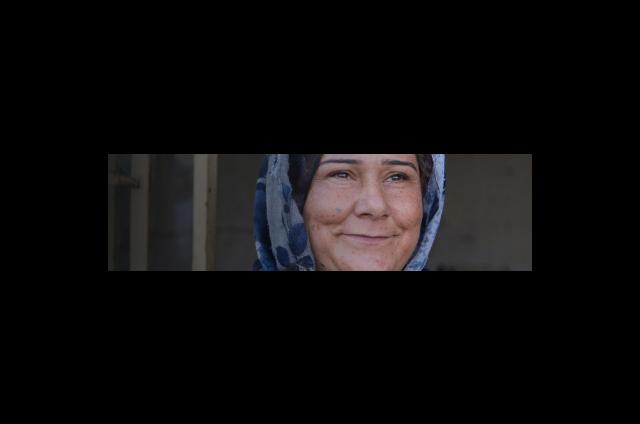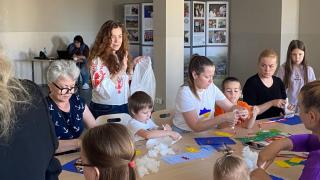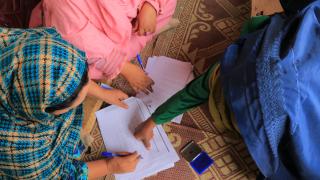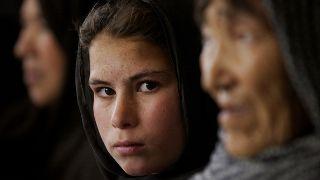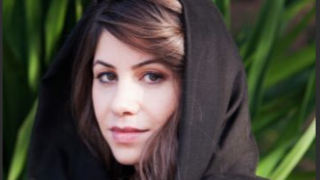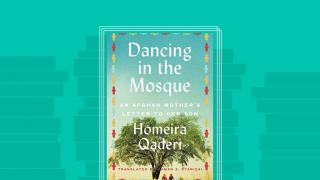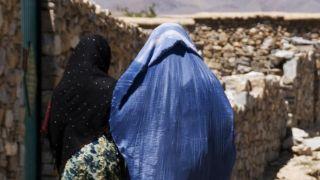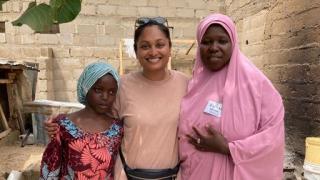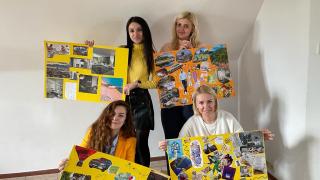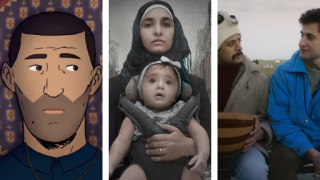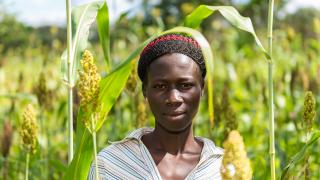Summer Reading: Celebrating Voices from Around the World
Summer Reading: Celebrating Voices from Around the World
Celebrating remarkable stories of courage and determination from conflict-affected countries
As we embrace the warmth of summer (sometimes metaphorically, depending on the weather!), we invite you to join us in exploring captivating narratives penned by talented female writers from around the world.
This curated summer reading list celebrates the rich diversity of cultures, histories and personal experiences through the lens of authors from eight conflict-affected countries where we work.
Dive into these stories that promise to inspire meaningful conversations and highlight universal truths about the human experience; reminding us that, despite our own origin stories, there is so much more that unites than divides us.
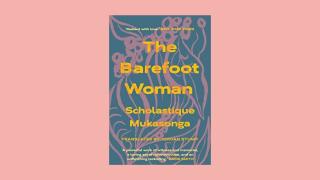
The Barefoot Woman
Scholastique Mukasonga (Rwanda)
"Her bare feet pressed deep into the memory of the earth."
Scholastique Mukasonga's memoir The Barefoot Woman beautifully captures the resilience of Rwandan culture amidst the turmoil of genocide. Through Mukasonga's heartfelt storytelling, we honour her mother's strength and the traditions that sustain their community in the face of unimaginable loss – and the glimmers of hope that follow it.
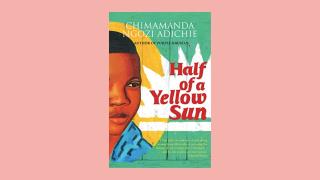
Half of a Yellow Sun
Chimamanda Ngozi Adichie (Nigeria)
"The world was silent when we died."
Chimamanda Ngozi Adichie's Half of a Yellow Sun transports us to Nigeria during the Biafran War, weaving together the lives of characters whose destinies are shaped by love, loyalty and the tumultuous events unfolding around them. Adichie's iconic prose invites us to reflect on the impact of conflict on personal identities and societal norms.
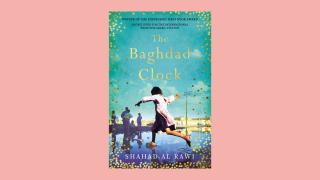
The Baghdad Clock
“Some meanings exist inside us but are sleeping.”
Set against the backdrop of 1990s Baghdad, Shahad Al Rawi's The Baghdad Clock offers a heartfelt exploration of friendship and hope through the eyes of two young girls. Al Rawi poignantly captures the essence of everyday life amidst political upheaval, highlighting the dreams of Iraqi youth and their determination to create a brighter future.
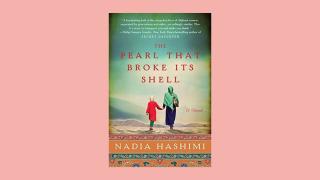
The Pearl That Broke Its Shell
Nadia Hashimi (Afghanistan)
“The human spirit, you know what they say about the human spirit? Is is harder than a rock and more delicate than a flower petal.”
Nadia Hashimi's The Pearl That Broke Its Shell intertwines the stories of Rahima and Shekiba, Afghan women separated by generations but connected by their yearning for autonomy in a patriarchal society. We’re given a glimpse into the realities Afghan women face as they navigate complex cultural norms and societal expectations.

The Tiger's Wife
“These stories run like secret rivers through all the other stories of his life.”
Téa Obreht's The Tiger's Wife blends folklore with a contemporary narrative set in post-conflict Balkans, where a young doctor uncovers family secrets amidst a landscape haunted by history. Readers are treated to lyrical prose that invites us to ponder themes of memory, identity and the enduring impact of war on personal and collective narratives.

Sworn Virgin
Elvira Dones (Kosovo)
“She was the only girl in the village enrolled in university. She didn't want to have children, she just wanted books. In the middle of the mountains you couldn't say this if you were born a woman."
Elvira Dones' Sworn Virgin explores the Albanian tradition of sworn virgins through the story of Hana, who adopts a male identity to escape societal constraints and pursue her dreams. Dones' novel challenges gender norms and champions the strength of women who, against all odds, are forging their own paths in a rapidly changing world.
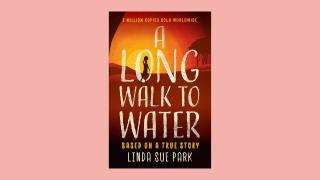
A Long Walk to Water
Linda Sue Park (South Sudan)
“One step at a time, one day at a time, just today, just this day to get through.”
Based on a true story, Linda Sue Park's A Long Walk to Water follows the lives of two young protagonists in war-torn South Sudan—Nya, who must trek long distances for water, and Salva, a young boy separated from his family by conflict. The immersive narrative sheds light on the stark challenges survivors of conflict face amidst daily adversity, highlighting the ongoing humanitarian crisis in South Sudan.

Mornings in Jenin
Susan Abulhawa (Palestine)
"We're all born with the greatest treasures we'll ever have in life. One of those treasures is your mind, another is your heart."
Susan Abulhawa's Mornings in Jenin spans generations of a Palestinian family's experience, offering an unflinching portrayal of displacement, resilience and the enduring hope for justice amidst the Israeli-Palestinian conflict. The empathetic storytelling encourages us to contemplate the universal need for belonging and peace — a message that is more timely than ever.
Continue reading
Women for Women International CEO, Laurie Adams, reflects on her visit to Poland to see how the survivors of the Russian invasion on Ukraine are able to maintain hope amidst chaos.
Afghanistan: We're Here To Stay
subtitle:
One year into the humanitarian and economic crisis in Afghanistan and the situation continues to worsen. Read about how we at Women for Women International are supporting our Afghan sisters.
Top 5 Fundraising Tips
subtitle:
Fundraising can be daunting if you have never done it before - but it is easier than you think! Here are our top five tips for a successful fundraiser.
In the past 12 months, we have seen women's rights in Afghanisan roll back - and they continue to be restricted more and more.
Hear from Afghan women
subtitle:
We've compiled a list of books, blogs, podcasts, (and more!) so you can hear directly from Afghan women and learn about their inspirational and courageous stories.
Summer Reading List 2022
subtitle:
This summer, get inspired by stories of resilience and courage of women by delving into our reading list.
In Afghanistan, women will have to wear a burqa in public. While the Taliban promised a moderate government when they took power again in 2021, more and more freedoms for women are now being curtailed.
Reflections from our visit to Nigeria
subtitle:
In June 2022, two members of our UK team, Preeya and Deetza, visited Nigeria to see our programme in action and hear from the women we serve. Read about their experience and the inspiring women they met there.
The lives of millions of people from Ukraine have been shattered by the Russian invasion - but thanks to the healing power of art therapy, women still have hope.
As the global refugee crisis has reaches a record high, it is crucial now more than ever to understand the obstacles facing refugees. This World Refugee Week, we have put together a list of seven must-see movies that provide an insight into the refugee experience and their powerful stories of survival.
As millions in Ukraine are forced to flee their homes, we must not forget about people in countries such as Afghanistan, South Sudan and Iraq who are also dealing with the effects of the war. Read about how the war in Ukraine is contributing to global hunger and leaving millions on the brink of starvation.
Marianne Kajokaya is our Country Director in South Sudan. In this blog, she shares how the war in Ukraine is affecting women in some of the world's poorest communities where we work in South Sudan.

